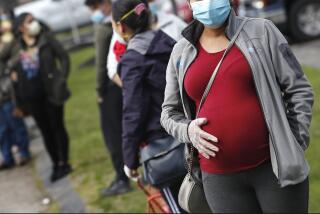Nursing Mothers Got AIDS Virus From Babies
- Share via
SAN FRANCISCO — Thirteen babies who became infected with the AIDS virus in Soviet hospitals have spread the virus to their mothers in what appears to be the first reported cases of infant-to-mother transmission through breast-feeding.
The cases, reported Thursday by Soviet researchers, are believed to represent a new, albeit rare, means of spreading the fatal virus. Experts in the field described the discovery as “interesting and disturbing” but said the phenomenon is unlikely to become widespread.
“I think worldwide it’s very rare,” said Dr. Vadim V. Pokrovsky of the Central Research Institute of Epidemiology in Moscow, who headed the study. He said the finding may be significant in Africa, where infants may be more likely than elsewhere to become infected through contaminated hospital syringes.
The Soviet cases, reported at the Sixth International Conference on AIDS, stem from an outbreak of human immunodeficiency virus infection in the cities of Elista, Rostov-on-Don and Volgograd in 1988. About 260 children were infected in hospitals by HIV-contaminated syringes that hospital staffers had reused, unaware that the equipment was contaminated.
Many of those children were breast-fed by their mothers upon returning from the hospital. Of those mothers, the researchers found that 16 have become infected with the virus. Upon close scrutiny of the mothers’ medical and sexual histories, the researchers found 13 whom they believe could only have become infected by their child.
By interviewing the mothers, the researchers found that those who became infected reported having had cracks in their nipples while they were breast-feeding. They also reported that at the same time their babies had had open sores in their mouths, making it possible for the babies’ infected blood to mix with the mothers’, spreading the virus.
“I am sure that it was really transmission from child to mother,” said Pokrovsky, chief of specialized research for the laboratory of AIDS epidemiology and prevention.
“They presented a very good case for what they documented,” said Dr. Francis A. Plummer of the University of Nairobi, who does research in mother-to-infant transmission. Plummer said he did not believe that the finding has widespread implications, but added, “It looks like solid stuff.”
According to Pokrovsky, the infant cases have been traced to a Soviet man who became infected in Africa, then returned to the Soviet Union. Pokrovsky said the man infected his wife, who then gave birth to an infected child who later died in a Soviet hospital.
Syringes containing that child’s blood were reused, spreading the virus to other children. Some of those children were then transferred to other hospitals. Pokrovsky said about 260 children became infected through contaminated syringes, but no new cases have been reported since May, 1989.
Pokrovsky said hospital staff members had been careful to change the needles in the syringes but were unaware that the syringes could also be contaminated. He said hospital workers, as a result of an educational campaign that arose out of the outbreak, no longer reuse unsterile syringes.
According to Pokrovsky, there are 35 reported cases of AIDS in the Soviet Union and 512 reported cases of HIV infection. That count is based on 66 million HIV tests performed throughout the country since January, 1988.
More to Read
Sign up for Essential California
The most important California stories and recommendations in your inbox every morning.
You may occasionally receive promotional content from the Los Angeles Times.












